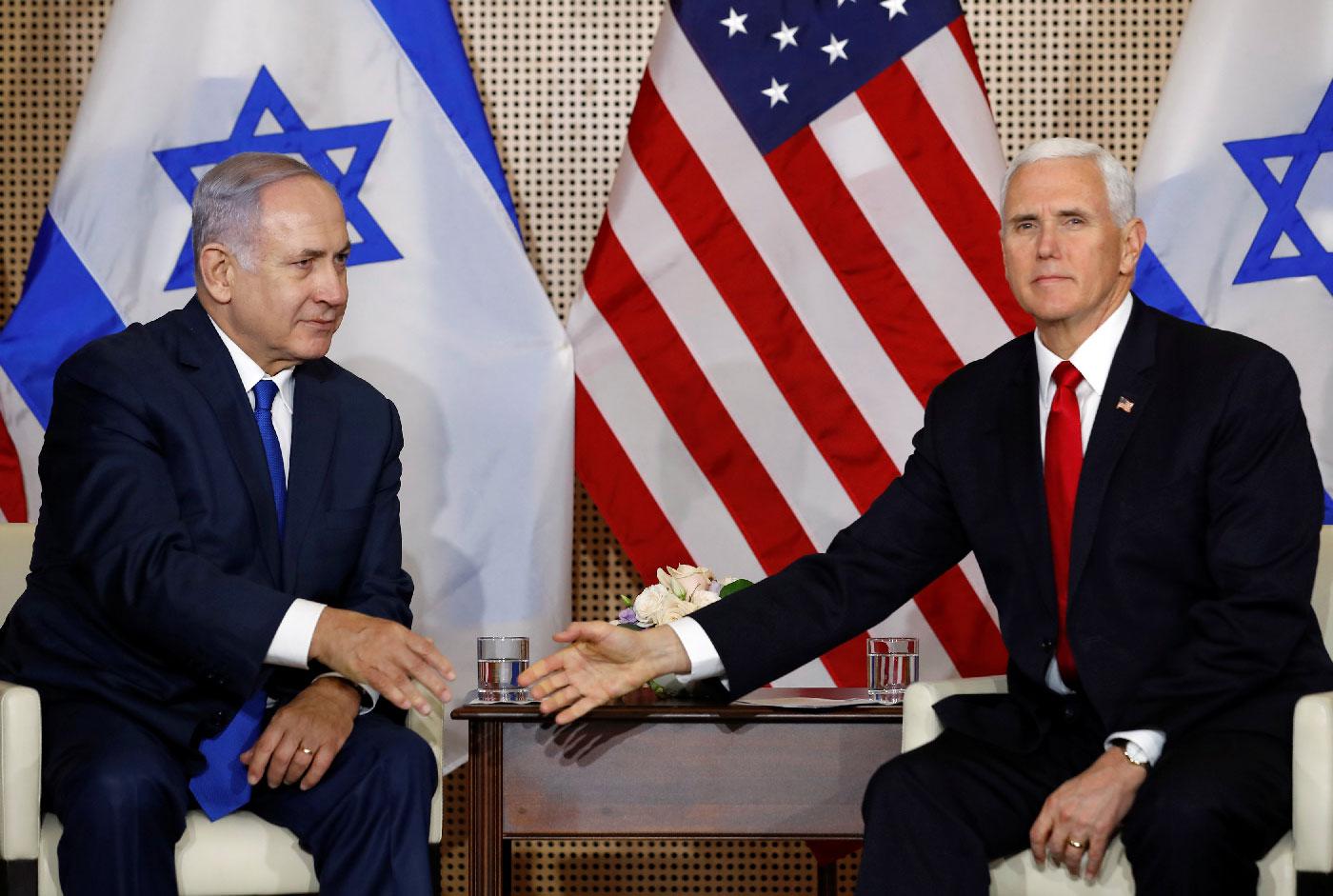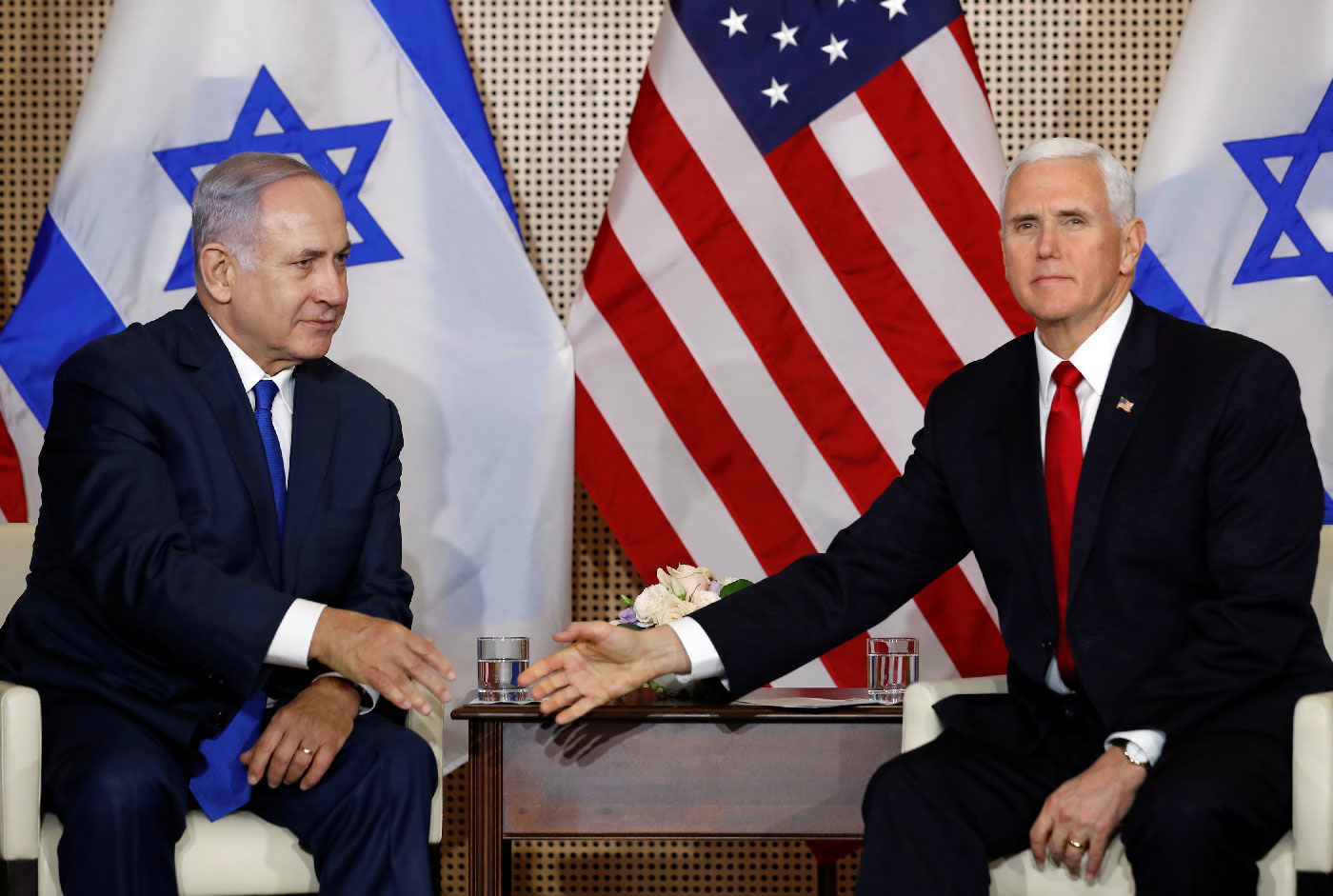Pence lashes out at EU over stance on Iran
WARSAW - US Vice President Mike Pence accused leading European countries on Thursday of trying to break US sanctions against Tehran, in remarks at a Middle East peace summit that were likely to further strain transatlantic relations.
Pence spoke at the conference in Warsaw attended by 60 countries, including Israel and six Gulf Arab states, but not the Palestinians or Iran.
European powers, who oppose the Trump administration's decision to pull out of a nuclear deal with Iran, were openly sceptical of a conference excluding Tehran. France and Germany declined to send their top diplomats, while British Foreign Secretary Jeremy Hunt left before Thursday's main events.
"Sadly, some of our leading European partners have not been nearly as cooperative," Pence said. "In fact, they have led the effort to create mechanisms to break up our sanctions."
Trump pulled the United States last year out of the 2015 Iran deal, under which Tehran agreed to curbs on its nuclear programme in return for the lifting of sanctions.
European countries say the move was a mistake and have promised to try to salvage the deal as long as Iran continues to abide by it. In practice, European companies have accepted new US sanctions on Iran and abandoned plans to invest there.
Europe "not divided"
Pence said a European scheme to trade with Iran, known as the Special Purpose Vehicle, was "an effort to break American sanctions against Iran's murderous revolutionary regime".
"It is an ill-advised step that will only strengthen Iran, weaken the EU and create still more distance between Europe and the United States," he said.
The European trade vehicle was conceived as a way to help match Iranian oil and gas exports against purchases of EU goods. However, those ambitions have been scaled back, with diplomats saying that, realistically, it will be used only for trade, for example of humanitarian products or food, allowed by Washington.
The summit venue in Poland could itself be seen as a rebuke to Washington's traditional Western European allies, who are at odds with a nationalist government in Warsaw over moves the EU says curb judicial independence and free speech.
Pence tacitly acknowledged that Iran is in compliance with the 2015 nuclear deal but said the issue was the accord itself, brokered under Trump's predecessor Barack Obama.
European leaders say the agreement was never meant to address all concerns with Iran and that Tehran is hardly the only problematic player in the region.
"Europe is not divided on the issue of Iran. Europe supports the nuclear accord with Iran," German foreign ministry official Niels Annen told reporters.
Another senior official from a major European power said "we strongly disagree" with Pence's remarks and said that other regional issues such as Syria and Yemen would be even more difficult to resolve if Iran is isolated.
"We are strongly against coalition-building and a coercion-only approach," he said.
"We want to push Iran to good results and don't want to push Iran outside of its nuclear commitment."
European allies were concerned that the conference would turn into an Iran-bashing session, which would only increase tensions with Tehran.
Niels Annen, Germany's minister of state, expressed scepticism over the meeting's likely outcome.
"I am hoping for constructive signals but nobody here has the expectation that this conference will solve problems," he told reporters on the sidelines of the meeting. "That would be unrealistic because we need a political agreement with all participants at the end of the day."
Historical turning
The Warsaw conference is timed just as Iran's clerical regime celebrates 40 years since the Islamic revolution ousted the pro-US shah.
A suicide attack in southeastern Iran on Wednesday killed 27 troops of the elite Revolutionary Guard.
Iranian Foreign Minister Mohammad Javad Zarif quickly tried to link the assault to the Warsaw conference, which he earlier dismissed as "another attempt by the United States to pursue an obsession with Iran that is not well-founded".
Pence did not mention the deaths and stopped just short of calling for regime change in Iran, which has been comparatively stable in recent years amid unrest throughout the Middle East.
Pence threatened further US sanctions as "the people of Iran take to the streets" and its "economy continues to plummet".
He accused Iran of plotting a "new Holocaust" with its opposition to Israel and regional ambitions in Syria, Lebanon, Iraq and Yemen.
"Freedom-loving nations must stand together and hold the Iranian regime accountable for the evil and violence it has inflicted on its people, on the region and the wider world," Pence said.
Pence only briefly mentioned concerns with Iran's Arab adversaries, saying the Trump administration would keep looking at the killing of US-based dissident Saudi writer Jamal Khashoggi.
The summit was notable because of the presence of Israel alongside wealthy Arab states. Washington aims to narrow differences between its Israeli and Arab allies to isolate Iran.
Israeli Prime Minister Benjamin Netanyahu, who met with Omani Foreign Minister Yousuf bin Alawi bin Abdullahon on the sidelines on Wednesday, called the conference a "historical turning point" in combating the threat from Iran.
"An Israeli prime minister and the foreign ministers of the leading Arab countries stood together and spoke with unusual force, clarity and unity against the common threat of the Iranian regime," Netanyahu told reporters as he arrived for Thursday's main session at a football stadium.
Israel only has diplomatic relations with two Arab countries, neighbouring Egypt and Jordan. But Gulf Arab leaders -- especially Saudi Arabia's powerful Crown Prince Mohammed bin Salman -- have increasingly put the issue of Palestine on the back burner as they instead push to contain historic rival Iran.
"Desperate circus"
But just as notable were the absences, not only of Iran itself -- which called the meeting a "desperate circus" -- but of the Palestinians, who refused to attend over what they regard as US bias against them under Trump. They have been boycotting the administration since Trump reversed decades of US policy in 2017 to recognise occupied Jerusalem as the capital of Israel.
Chief Palestinian Negotiator Saeb Erekat took aim at the Arab states for attending, citing an Arab meeting last year that reaffirmed demands that Israel first withdraw from the Palestinian land it occupies before it can normalise ties with Arab countries.
"Reward the occupation, the decision to abolish the Arab Peace Initiative and the decisions of the Dhahran Summit. For what? Mediation between America and Israel on the one hand and Iran on the other," Erekat tweeted.
Nabil Abu Rudeineh, spokesman for Palestinian President Mahmoud Abbas, said the only path to peace was by negotiating with the Palestinian leadership represented by Abbas.
US Secretary of State Mike Pompeo called for an era of cooperation at opening remarks that were broadcast publicly. The rest of the meeting, including a presentation by White House advisor and Trump son-in-law Jared Kushner on plans for Israeli-Palestinian peace, was held behind closed doors.
A senior European official who listened to the closed-door presentation was underwhelmed.
"Nothing new at all. It is obvious that everybody is now waiting for the outcome of Israeli elections," the official said on condition of anonymity.
Kushner and Trump's Middle East envoy Jason Greenblatt are trying to broker a peace plan to cover all core issues of the decades-old conflict between Israel and the Palestinians, US officials say. Release of the plan has been delayed by Palestinian anger at Trump's change of US policy on Jerusalem.
Nabil Shaath, an adviser to Palestinian president Mahmud Abbas, wrote in Israel's Haaretz newspaper that the Warsaw meeting has "tried to normalise the Israeli occupation and the systematic denial of the Palestinian right to self-determination".
Pence said that the United States wanted a "lasting peace" but that it "will never fail to stand with our ally Israel".



